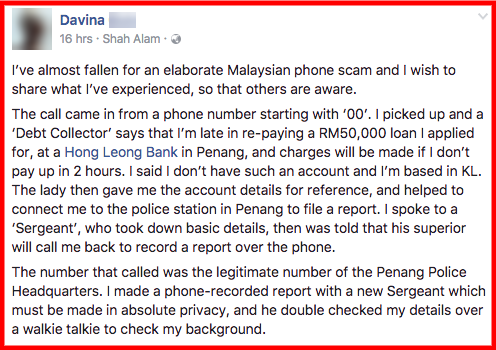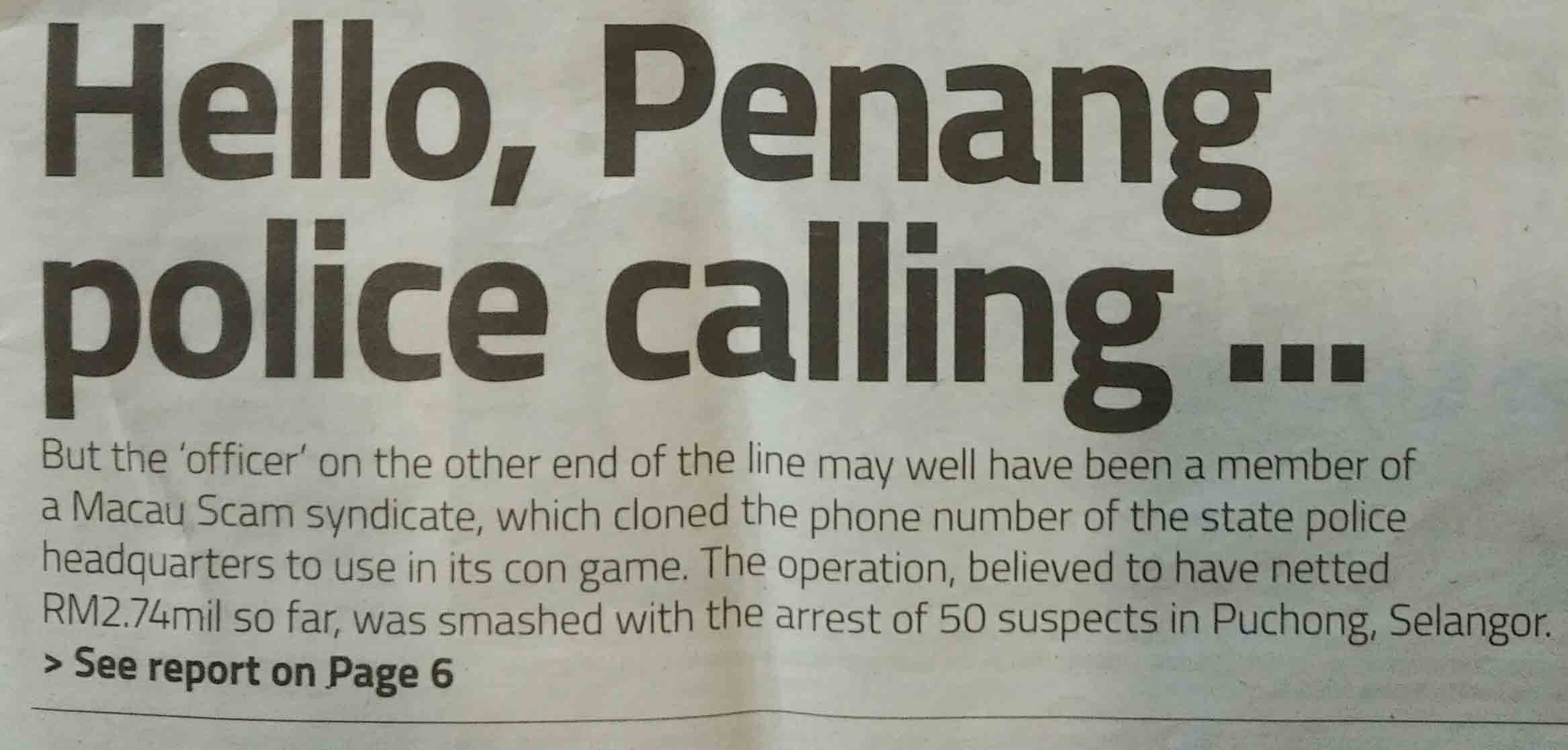

Consumer,Criminal
This Malaysian scam is scary... because you get called by the "PDRM" or "Bank Negara"
over 7 years ago UiHuaGood news! There's a Nigerian Prince who needs your help to transfer $5 million out of the country, and he will pay you $1 million if you help him!
While most of us can laugh when we see this in our inboxes (assuming it doesn't go straight to spam) thanks to warnings being posted on the internet, scams that attempt to get you to transfer money or part with your confidential information like banking passwords are still rampant - with people still falling for variations of the Nigerian Prince scam today.
However, Davina wasn't laughing when she received a call, supposedly from a local bank, which led to a two-and-a-half hour conversation with "police investigators" accusing her of being an accomplice in drug dealing activities.

More recently, an accountant lost RM510,000 to scammers claiming to be Bank Negara officers. It’s very important to note that a core part of this scam involves getting victims to transfer money to them. If you ever get such a call, hang up and check with the relevant authorities or bank via their hotline number and NOT the one provided to you by the scammers.
This is the "Macau Scam", and they've conned Malaysians of RM2.7 million

The Macau scam isn't new, with news of arrests going back to 2014. It would also not be a far stretch to assume that the scam is still ongoing despite the recent bust on July 4th.
It's important to note that scams are constantly evolving, and what's currently known as the Macau Scam bears some resemblance to IRS Scams in the US, where people impersonating Internal Revenue Service (tax) collection agents call up unsuspecting victims to inform them that they've either committed tax fraud or have unpaid taxes.
The scammers often go through great lengths to appear convincing, which in Davina's case extended to the point of spoofing the number of the Penang Police Headquarters and having a senior "Inspector" around for the specific purpose of scolding her for not understanding Bahasa. You can - and should - read the full account at the end of this article, reproduced with Davina's permission.
Here's a summary of what happened:
Davina receives a call from a debt collector from Hong Leong Bank in Penang, informing her that the bank will be taking legal action against her for not repaying a RM50,000 loan. Davina says she doesn't have such an account and the debt collector connects her to the police station in Penang to file a report. She speaks to a Sergeant who informs her the call will be recorded, and asks her to verify that the phone number is from the Penang Police Headquarters.
The Sergeant says that her name is associated in a drug bust, where over RM250,000 in drug money is untraced. Based on evidence and testimony from the arrested dealer, the police believe that she sold her IC and bank account details to drug dealers.
She's asked to reveal her current account balances (but NOT her passwords, because police don't have the right to ask for those details), and any money that wasn't declared can be used against her in court. The sergeant also warned her against discussing the case with others, as it might jeopardize the investigation.
The Sergeant that forwards Davina to his superior to explain her side of the story, but he scolds her for not understanding Bahasa before hanging up. The Sergeant then calls back and tells her that he believes she isn't involved and would like to allow her to help in the investigation. He gives her two choices - either cooperate with him without telling anyone, or be detained for interrogation at the Penang Police HQ for 45 days. He also reminds her that the punishment for drug dealing is death.
Of course, Davina chooses to cooperate. He says that because the bank will be suing her in an hour, she needed to quickly transfer all her money, from all her bank accounts, to the Magistrate's Court account for auditing. Of course, he will stay on the phone to guide her through the process. It's at this point Davina realizes that something fishy was going on and ends the call.
As these cons usually rely on exploiting human weaknesses like fear, greed, or ignorance to work; there may be common elements or factual errors that can serve as warning signs. We'll be looking at 5 of these elements that may save you a whole lot of heartache the next time you get a call from the "authorities".
On the legal end of things, we consulted with lawyer Fahri Azzat, who commented:
"Wow. What a scam! I'm impressed as much as I am appalled."
1. The authorities will never conduct an investigation over the phone

Whether from the PDRM, Bank Negara, or LHDN, the authorities will not conduct an entire investigation over the phone, much less ask you to transfer "evidence" to them.
Fahri explains that while there's probably no law or procedure prohibiting the police from questioning you over the phone, it doesn't make sense for them to do so when they can use Section 111 of the Criminal Procedure Code to get you to show up at the police station for a statement.
"I have NEVER heard of questioning/investigating by phone by the police. They won't do it because they have to take down the statement in writing, print out the statement, have you read it, and sign it.
It does not make procedural or logistic sense to make such a phone call" - Fahri Azzat, in email reply to ASKLEGAL
However, scammers will try to establish a sense of legitimacy to prove that they are whoever they say they are. In Davina's case, this was done by the Sergeant asking her to not reveal banking passwords (which is actually correct), and asking her to Google the phone number to show he was calling from the police headquarters:
"He said check the number now on Google, to make sure we're calling trom Ibu Pejabat Kontingen. I should have had bells ringing at the time, but I didn't." - Davina, when contacted by ASKLEGAL
We should note that this doesn't mean the police were involved in the scam; the call was actually achieved using call spoofing, and it's been previously used in other scams involving calls from banks. Banks such as RHB have previously posted warnings about receiving calls from spoofed numbers.
2. Watch out for the Good Cop - Bad Cop setup

Good Cop - Bad Cop is an actual psychological technique used in various settings, from police interrogation to business negotiation; where the Bad Cop would break down the victim while the Good Cop is understanding and sympathetic towards the victim, establishing trust. The Good Cop then uses this trust to get what they need from the victim.
It should be noted that Good Cop - Bad Cop doesn't only involve scammers masquerading as the police. For example, one variation of the IRS scam targeting US immigrants would have the collection agent's manager insulting and threatening the victim with deportation before handing the phone back to the collection agent, who will promise to sort it out once the payment is made.
It's by coincidence that Davina's case involved literal cops:
I was forwarded on to explain my case to the Sergeant’s superior, an Inspector, who responded rudely to me for not being able to speak in Bahasa, and hung up.
The Sergeant then called the Inspector back, with me still on the other line, to explain that he believed that I was not an accomplice and would like to allow me to help with the investigation.
3. If there's a time limit, it's time to end the call

The scarcity principle is a technique commonly used in marketing, but is unfortunately also equally as effective in scams. You may have come across this as "limited time offers" - a once in a lifetime opportunity that will never be available again once the period expires.
This is effective on two fronts... that when something is limited, we tend to attach greater value to it - making us want it more. The second is that the short time frame doesn't give us the opportunity to sit down and logically think things through. In essence, it makes us more reliant on emotions rather than logical judgment, which usually doesn't bode well.
Hitman scam is a thing. Image from Zeltser.com
We see this used across all manner of scams, whether it's the Nigerian Prince who needs to get the money out before the government changes, or Scotsman Gregor MacGregor's "Poyais Scam" in 1822, where MacGregor used the scarcity principle (along with other techniques) to not only only convince investors to part with their money, but also for 250 of his countrymen to set sail and colonize the rich island nation of Poyais before other countries did. Unfortunately, Poyais never existed, and 2/3 of the "settlers" died in the process.
In Davina's case, the scarcity principle was applied in the form of criminal charges and legal action from the bank:
"I picked up and a ‘Debt Collector’ says that I’m late in re-paying a RM50,000 loan I applied for, at a Hong Leong Bank in Penang, and charges will be made if I don’t pay up in 2 hours. ...
...the sergeant told me the next step. Because the bank was to sue me in an hour, I needed to act fast."
4. They'll usually try to get you to keep it a secret

For the obvious reason of preventing an outsider from foiling their plans, scammers would usually try to find a way to prevent you from discussing the situation with others. While methods would include asking you to stay on the phone, or telling you (in the case of investment/money transfer scams) that discussing the matter might jeopardize the entire deal.
I was also told not to speak to anyone about this case, for there were many suspects still not caught, and there was a chance that one of them might be in my social circles.
In instances where the person calling you claims to be from a certain bank or government authority, it's best to tell them that you will call the relevant agency yourself while ignoring any numbers they might ask you to call. And no, you can't get in trouble for doing this.
5. They take advantage of your lack of knowledge

A very popular scam currently happening across the globe is the Microsoft Tech Support Scam, where scammers impersonating Microsoft tech support personnel would call and inform victims that there was a problem with their computer and convince them to grant remote access to their computer. Once this is done, scammers can install spyware/and or steal personal information - some even charging for the "service"!
Microsoft has stated that most victims who fall for the scam are those who are unfamiliar with technology.
Scammers would usually assume a role of authority (which in the case of the Macau Scam is the police) in order to make victims more compliant, especially if the victims aren't equipped with the necessary knowledge to believe otherwise. While we've already covered police procedure in the first point, it's also worth noting that, even if true, Davina would not have been facing the death penalty for her involvement:
Assuming if it was true, she could be charged for selling her ID. [For the drug charge] I don't know what 'evidence' they would have to link her... the police would have a lot of things to prove." - Fahri Azzat
In such a situation, having at least a base knowledge of the law and your rights may allow you to spot the scam early on, and to call the scammer's bluff:
"A good response in such a scenario would be to say 'Send me a Section 111 notice, then I will come.'
That will put them on alert that (1) You know enough criminal procedure and; (2) You may not be an easy target" - Fahri Azzat
Reading more Asklegal articles can perhaps be a good start. Here's our article on Malaysian drug laws.
It's always an "obvious con job"... until it happens to you
You might laugh this off and say that you saw the con happening a mile away while reading this, but it's a very different situation when you're actually caught in the thick of it. While Davina eventually realized it was a scam before any damage was done (other than the loss of time and having to cancel appointments), others have fully complied and lost their savings as a result.
As scams continue to evolve, there's no single tried-and-true method of keeping yourself safe - other than keeping your wits about you and being aware of your rights (and the law) when contacted by people claiming to be from enforcement agencies.
Davina's story
The call came in from a phone number starting with ‘00’. I picked up and a ‘Debt Collector’ says that I’m late in re-paying a RM50,000 loan I applied for, at a Hong Leong Bank in Penang, and charges will be made if I don’t pay up in 2 hours. I said I don’t have such an account and I’m based in KL. The lady then gave me the account details for reference, and helped to connect me to the police station in Penang to file a report. I spoke to a ‘Sergeant’, who took down basic details, then was told that his superior will call me back to record a report over the phone.
The number that called was the legitimate number of the Penang Police Headquarters. I made a phone-recorded report with a new Sergeant which must be made in absolute privacy, and he double checked my details over a walkie talkie to check my background.
The Sergeant then told me that my name is associated with a big drug heist that has just happened. The drug dealer was caught with 16kg of meth and has made over half a million ringgit from it, with half of it still not traced. In the dealer’s statement, he’s said that I’ve sold my IC and bank account details to him to earn some profit from the dealings. There was also a lot of evidence presented by the dealer to prove of me being a willing accomplice. The sergeant proceeded to blatantly accuse me of hiding something, to which I had to convince him that I was innocent.
I was asked to officially state, over the phone for recording / report purposes, all of my current balances with all of my bank accounts, to declare as legal money. I dug out all the statements I had on me and listed them out. (The Sergeant told me not to reveal private details like passwords, as authorities like him don't have the right to ask that of civilians.) Whatever amount I didn’t declare appropriately would be used against me in court. I was also told not to speak to anyone about this case, for there were many suspects still not caught, and there was a chance that one of them might be in my social circles.
I was forwarded on to explain my case to the Sergeant’s superior, an Inspector, who responded rudely to me for not being able to speak in Bahasa, and hung up. The Sergeant then called the Inspector back, with me still on the other line, to explain that he believed that I was not an accomplice and would like to allow me to help with the investigation.
The Sergeant hung up and told me that his Inspector gave me two choices: either I cooperate with the investigations in complete confidentiality, or I get arrested under warrant and get detained for interrogations at police HQ in Penang for a minimum of 45 days. If I chose the former, then the Sergent’s job was to be on the line if I was proven guilty, and the punishment for drug dealing here in Malaysia, he reminded me, was death.
I chose to cooperate, of course, and with complete trust in each other, the sergeant told me the next step. Because the bank was to sue me in an hour, I needed to act fast. The magistrate court would need to do an audit on all of my bank accounts, and therefore, I’d need to immediately head to each of my banks and transfer all of my legit earnings to the court account, with him staying with me on the line to guide me. At this point, I said, ‘Sergeant, I don’t believe you,’ hung up on the 2.5-HOUR phonecall, cried and screamed my lungs out, with my poor clueless husband consoling me, and went to the nearest police station to make a REAL report.
The police staff informed me that a lot of similiar scams have been reported recently. Nevertheless, they were impressed at how intricate the setup was.
I've called up Hong Leong Bank to report the case, and they are already investigating the issue.
I spent the whole of yesterday in trauma from this event. I was angry that I cancelled important plans, and that I was so easily fooled. I was sad at how people would go to such lengths to create such incredible scams, when they could be spending all that time and effort to make REAL respectable lives for themselves. Most of all, I’m worried that someone as aware and intelligent as I could have fallen for such a trap, because that means that so many others may not be so lucky to stop themselves from sending out their life savings out and never seeing it again.
Chief keyboardist at Asklegal. Don't ask me legal questions. Ask me about the tramp joke instead.
